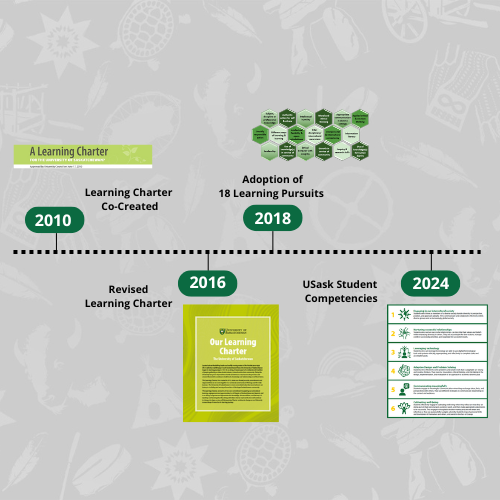Overview
- Our journey of teaching and learning
- Our teaching and learning pursuits
- Our commitments and responsibilities to one another
The Learning Charter states the responsibilities and committments that educators have to our students and our community:
|
The active commitment of those members of the university community responsible for providing learning opportunities is crucial to optimizing the student learning experience.To do so, university educators (including faculty, sessional lecturers, graduate teaching assistants, and other instructors) need to act as role models, making the following commitments and fulfilling the corresponding responsibilities.Educator commitments can be summarized as Exemplify Learning, Strive for Excellence in Teaching, Assess Fairly, and Enhance Continuously. Our Learning Charter, Committments, Educators |
Our Learning Charter in Practice
Educator support
Making the Learning Pursuits actionable for our learners: USask Student Competencies
Our learning pursuits are meaningful aspirations for our entire university community, but their richness can be challenging to apply directly in academic programs. The six USask Student Competencies turn these pursuits into actionable goals, equipping students with the essential knowledge, skills, and attributes to excel both within and beyond our university.
These competencies may be expressed differently across disciplines and programs, reflecting the unique focus of each field, however; all USask graduates will leave with the ability to nurture relationships, engage in intercultural society, leverage technology, solve problems adaptively, communicate effectively, and cultivate well-being. Learn more about the USask Student Competencies and how to embed them in your course.
Making Our Learning Charter actionable in our teaching practice: Certificate in University Teaching and Learning
For educators using the Educator Commitments as a foundation for teaching practice, USask offers the Certificate in University Teaching and Learning (CUTL) through the Gwenna Moss Center for Teaching and Learning (GMCTL).
This certificate offers USask faculty, sessionals and lab instructors the opportunity to develop & document their competencies that are based on the Educator Commitments.
If you are a graduate or post-doctoral student, USask offers the Teaching Preparation Certificate (GPS 986) to support you in your teaching journey.
History of the Learning Charter and competencies

The Learning Charter was originally created in 2010 to 'state our shared pursuits, commitments and responsibilities as we come together in a university community of life-long and life-wide learners.'
It was revised in 2016 to include Indigenous knowledges and experiences, and 'is our commitment to opening our university to learning, engagement and opportunities for all Peoples of Saskatchewan and beyond, and in so doing, recognizes and appreciates the knowledge, diverse abilities, and the ways of teaching and learning that they bring with them.'
In 2018, the original goals of the charter were replaced with 18 broad learning pursuits. The practical application of these pursuits revealed challenges in their integration into program renewal/development, prompting a further refinement into six practical and usable competencies.
2024 is the introduction year for the six USask Student Competencies, grounded in the Learning Charter Pursuits. These competencies are aligned with institutional strategic priorities, and serve as a means of focusing our efforts in teaching and learning through creation of a central foci that will advance multiple university priorities including sustainability, reconciliation, internationalization, EDI, and mental health and well-being.

